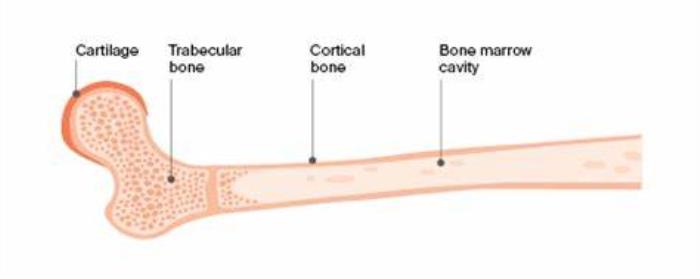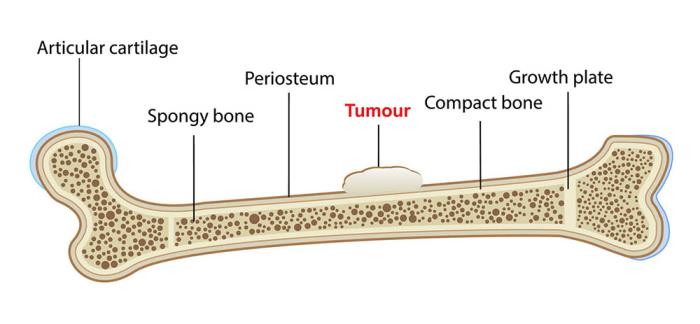Bone cancer can be categorized into two primary types: primary bone cancer and secondary bone cancer. Primary bone cancer originates in the bone itself, while secondary bone cancer occurs when cancer cells spread to the bone from other parts of the body. Understanding these distinctions is crucial for diagnosis and treatment.
Medical disclaimer: This content is for general awareness and does not replace a doctor’s consultation. For diagnosis or treatment decisions, consult a qualified specialist.
Defining Primary Bone Cancer
Primary bone cancer refers to malignancies that begin in the bone tissue. The most common types include osteosarcoma, chondrosarcoma, and Ewing sarcoma. These cancers typically affect younger individuals and can lead to significant morbidity if not diagnosed early.
Characteristics of Primary Bone Cancer
Primary bone cancers are characterized by their origin in the bone. They often present as painful masses and can lead to swelling or fractures. The exact cause remains largely unknown, but genetic factors and previous radiation exposure may play a role in their development.

Defining Secondary Bone Cancer
Secondary bone cancer, also known as metastatic bone cancer, occurs when cancer cells from other organs, such as the breast, prostate, or lung, spread to the bones. This form of cancer is more common than primary bone cancer and indicates advanced disease.
Characteristics of Secondary Bone Cancer
Secondary bone cancer typically presents with bone pain, fractures, and sometimes swelling. The prognosis often depends on the primary cancer's type and stage, as well as the extent of bone involvement. Treatment focuses on managing symptoms and prolonging life.
Common Types of Primary Bone Cancer
Primary bone cancers include several types: osteosarcoma (most common in adolescents), chondrosarcoma (arising from cartilage), and Ewing sarcoma (affecting children and young adults). Each type has unique characteristics, treatment protocols, and prognoses.
Common Types of Secondary Bone Cancer
Secondary bone cancer can arise from various primary tumors. The most common sources include the breast, prostate, lung, and kidney. Understanding the origin of metastatic cancer is crucial for effective treatment planning and management.
Symptoms of Primary Bone Cancer
Symptoms of primary bone cancer often include persistent bone pain, swelling, and tenderness near the affected area. Patients may also experience unexplained weight loss, fatigue, and reduced mobility, which warrant further investigation.
Symptoms of Secondary Bone Cancer
Symptoms of secondary bone cancer frequently involve bone pain, which may worsen at night or with activity. Other symptoms can include fractures, swelling, and systemic signs such as fatigue or unexplained weight loss, reflecting the underlying metastatic disease.

Diagnosis of Primary Bone Cancer
Diagnosis of primary bone cancer typically involves imaging studies such as X-rays, CT scans, and MRIs, followed by a biopsy to confirm the malignancy. Blood tests may also assist in evaluating overall health and identifying tumor markers.
Diagnosis of Secondary Bone Cancer
Diagnosing secondary bone cancer often starts with imaging studies to assess bone involvement. A history of primary cancer is crucial, and a biopsy may be performed to confirm the cancer's origin. Blood tests can also help evaluate the extent of disease.
Treatment Options for Primary Bone Cancer
Treatment for primary bone cancer primarily involves a combination of surgery, chemotherapy, and radiation therapy. The specific approach depends on the cancer type, stage, and patient's overall health. Surgical removal of the tumor is often the first line of treatment.
Treatment Options for Secondary Bone Cancer
Management of secondary bone cancer focuses on controlling pain and improving quality of life. Treatment options may include hormonal therapy, chemotherapy, radiation therapy, and bisphosphonates to strengthen bones and reduce fracture risk.

Prognosis of Primary Bone Cancer
The prognosis for primary bone cancer varies significantly based on factors such as tumor type, size, and stage at diagnosis. Early detection and treatment can improve outcomes, with some patients achieving long-term remission.
Prognosis of Secondary Bone Cancer
Prognosis for secondary bone cancer is generally less favorable than for primary bone cancer, as it indicates advanced disease. The overall survival rate largely depends on the type of primary cancer, treatment response, and the extent of metastasis.
Research and Advances in Bone Cancer Treatment
Recent research in bone cancer treatment focuses on targeted therapies and immunotherapy, which aim to improve outcomes and reduce side effects. Clinical trials are ongoing to evaluate new treatment modalities and combinations for both primary and secondary bone cancers.
Importance of Multidisciplinary Care in Bone Cancer
A multidisciplinary approach is essential in managing bone cancer effectively. Involving orthopedic surgeons, oncologists, radiologists, and palliative care specialists ensures comprehensive care, addressing both the physical and emotional needs of patients.
The Role of Biopsies in Confirming Bone Cancer Diagnosis
Accurate diagnosis is a cornerstone of effective treatment for bone cancer. The role of biopsies in confirming bone cancer diagnosis is crucial as they provide detailed insights into the type and stage of cancer. This article explains how biopsies help oncologists design precise treatment plans for improved patient outcomes.
Understanding the Importance of Bone Health Post Cancer Treatment
Post-treatment care plays a pivotal role in recovery and quality of life for cancer survivors. Understanding the importance of bone health post-cancer treatment focuses on strategies to maintain bone density, prevent fractures, and ensure long-term musculoskeletal health following cancer therapy.
Role of Palliative Care in Bone Cancer Management
Palliative care plays a vital role in managing symptoms and improving the quality of life for patients with bone cancer. This specialized care focuses on pain management, psychological support, and addressing the needs of patients and their families.
Best Bone Cancer Treatment in India
The Best Bone Cancer Treatment in India includes innovative approaches such as limb-sparing surgery, chemotherapy, and targeted therapies to effectively combat bone cancer.
Best Bone Cancer Hospitals in India
The best bone cancer treatment hospitals in india are equipped with advanced diagnostic tools and multidisciplinary oncology teams, ensuring comprehensive care and excellent outcomes for patients.
Bone Cancer Treatment Cost in India
The bone cancer treatment cost in india is affordable, offering world-class treatment options that cater to both local and international patients.
Best Bone Cancer Specialists in India
The Best Bone Cancer Specialists in India are highly experienced in diagnosing and managing bone cancer, providing personalized care plans to meet each patient’s needs.
FAQs About Primary and Secondary Bone Cancer
What are the main differences between primary and secondary bone cancer?
The primary difference lies in their origin: primary bone cancer originates in the bone itself, while secondary bone cancer spreads to the bone from other organs. Understanding this distinction is crucial for treatment and prognosis.
How can I recognize the symptoms of bone cancer?
Common symptoms include persistent bone pain, swelling, and tenderness in the affected area. Patients may also experience fractures and systemic symptoms like fatigue and weight loss, indicating the need for medical evaluation.
What treatment options are available for bone cancer?
Treatment options vary based on cancer type and stage. Primary bone cancer is often treated with surgery, chemotherapy, and radiation, while secondary bone cancer management focuses on pain relief and controlling the primary disease.
What is the prognosis for bone cancer patients?
Prognosis varies significantly between primary and secondary bone cancers. Early-stage primary bone cancer has a better prognosis, while secondary bone cancer generally indicates advanced disease with a poorer outlook.
Discover the Best Oncologists and Cancer Hospitals in India
When it comes to cancer treatment, finding the right specialist and hospital can make a significant difference in the outcome. In this blog, we have compiled a list of the top oncologists and cancer hospitals across major cities in India, ensuring that you have access to the best care available.
Top Oncologists in Major Cities
For those seeking expert oncologists, we have identified the best specialists in key cities:
Leading Cancer Hospitals
In addition to finding the right specialist, choosing the right hospital is crucial for comprehensive cancer care. Here are the top hospitals in major cities:
Get more indepth information on Cancer treatments and their costs
Conclusion
Finding the right oncologist and hospital is the first step in your cancer treatment journey. Explore the links above to learn more about the top specialists and hospitals in your area.
Explore the critical role of bone grafts in reconstructive surgery following bone cancer resection. Learn about different types of bone grafts, their benefits, and how they contribute to patient recovery and quality of life. The Role of Bone Grafts in Bone Cancer Reconstruction Surgery
Discover how nanotechnology is transforming bone cancer treatment by enhancing drug delivery, improving imaging techniques, and enabling innovative therapies. Learn about the latest advancements and their impact on patient outcomes. The Role of Nanotechnology in Bone Cancer Treatment
Explore the latest advances in bone cancer treatment options available in India. Learn about cutting-edge therapies, innovative surgical techniques, and the top hospitals leading the way in providing comprehensive care for bone cancer patients. Discover how India is becoming a hub for advanced bone cancer treatments, offering hope and improved outcomes for patients. Advances in Bone Cancer Treatment Options in India